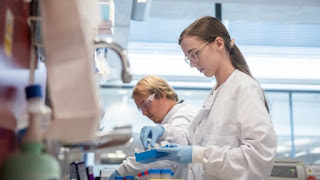A large-scale trial has shown that the coronavirus vaccine developed by Oxford University is highly effective in preventing covid-19 symptoms in people taking it.
Preliminary data suggest a 70 percent protection rate, but researchers say the rate could rise to 90 percent through dose adjustment.
These results are seen as a victory, but they come after the two vaccines developed by Pfizer and Moderna showed 95 percent protection.
However, the Oxford University vaccine is much cheaper, easier to store and deliver to every corner of the world than the other two vaccines.
Thus it will play an important role in the fight against the epidemic, if they got regulatory approval.
“Today’s announcement brings us one step closer to when we can use vaccines to end the devastation caused by the virus,”said vaccine engineer Professor Sarah Gilbert.
The British government has pre-ordered 100 million doses of the Oxford Vaccine, enough to immunize 50 million people.
British Prime Minister Boris Johnson said it was “hugely exciting news” and that while safety tests on the vaccine are yet to be carried out, they are “fantastic results.”
What did the experience show?
I’ve been developing the vaccine in about 10 months, a process that usually takes a decade.
More than 20 thousand people took part in the experiment, half of them in the UK, the other half in Brazil.
There were 30 cases of covid-19 among people who received two doses of the vaccine and another 101 cases of people who received a dummy injection.
The vaccine succeeded in providing 70 percent protection, the researchers said.
When volunteers were given two “high” doses, the protection rate was 62 percent, but this rose to 90 percent when people were given a “low” dose followed by a high dose. It is unclear why there is such a difference in the ratio.
“We are really pleased with these results,”Professor Andrew Pollard, principal investigator of the experiment, told the BBC.
He said the data on the 90 percent efficiency ratio was “interesting “and meant that”we will have more doses to distribute.”
Professor Pollard added that there were lower levels of asymptomatic infection in the group of volunteers who received a low dose followed by a high dose, “which means we may be able to stop the virus from the beginning.”
Comment on the photo،
AstraZeneca prepares to produce billions of doses for worldwide distribution after vaccine gets needed approval
When Will I get the vaccine?
There are four million doses ready for distribution in the UK and another 96 million doses will be delivered.
But nothing can happen until the vaccine is approved by regulators who will evaluate the safety and effectiveness of the vaccine and ensure that it is manufactured to the highest standards. This process will take place in the coming weeks.
However, the UK is ready to give the green light to an unprecedented mass immunisation campaign that dwarfs annual flu vaccination programmes or childhood vaccinations.
Residents and staff of nursing homes will be the first to receive the vaccine, followed by health care workers and the elderly over the age of 80. The plan provides for a subsequent transition to lower age groups.
How does the vaccine work?
The vaccine is a common, genetically modified, leaching virus that usually infects chimpanzees.
The virus has been modified to prevent it from infecting people and to carry samples of a portion of coronavirus, known as Spike protein.
Once these forms are inside the body, they begin to produce the coronavirus spike protein, which the body’s immune system recognizes as a threat and tries to destroy.
And when the immune system actually encounters the virus, it now knows what it will do.
Are the results disappointing?
After Pfizer and Moderna were able to produce vaccines that provide 95 percent protection against covid-19, 70 percent is relatively disappointing.
But, any percentage above 50 in imams would have been a victory a month ago.
This vaccine can also be stored at normal refrigerator temperature, which means it can be distributed to every corner of the world, unlike the two vaccines produced by Pfizer/bionetek and Moderna, which need to be stored at very low temperatures.
AstraZeneca, Oxford University’s manufacturing partner, is preparing to manufacture three billion doses globally.
What difference does it make to my life?
The vaccine is something that we spent a year waiting for and for which closures were imposed to buy time.
However, producing enough vaccines and then immunizing tens of millions of people in the UK, and billions around the world, remains a daunting task.
Life will not return to normal tomorrow, but the situation may change a lot with protection for those most at risk.
Health Secretary Matt Hancock told the BBC’s Brexit programme that we will be “in a closer-to-normal situation” by the summer but ” until we have that vaccine in hand, we all have to take care of each other







